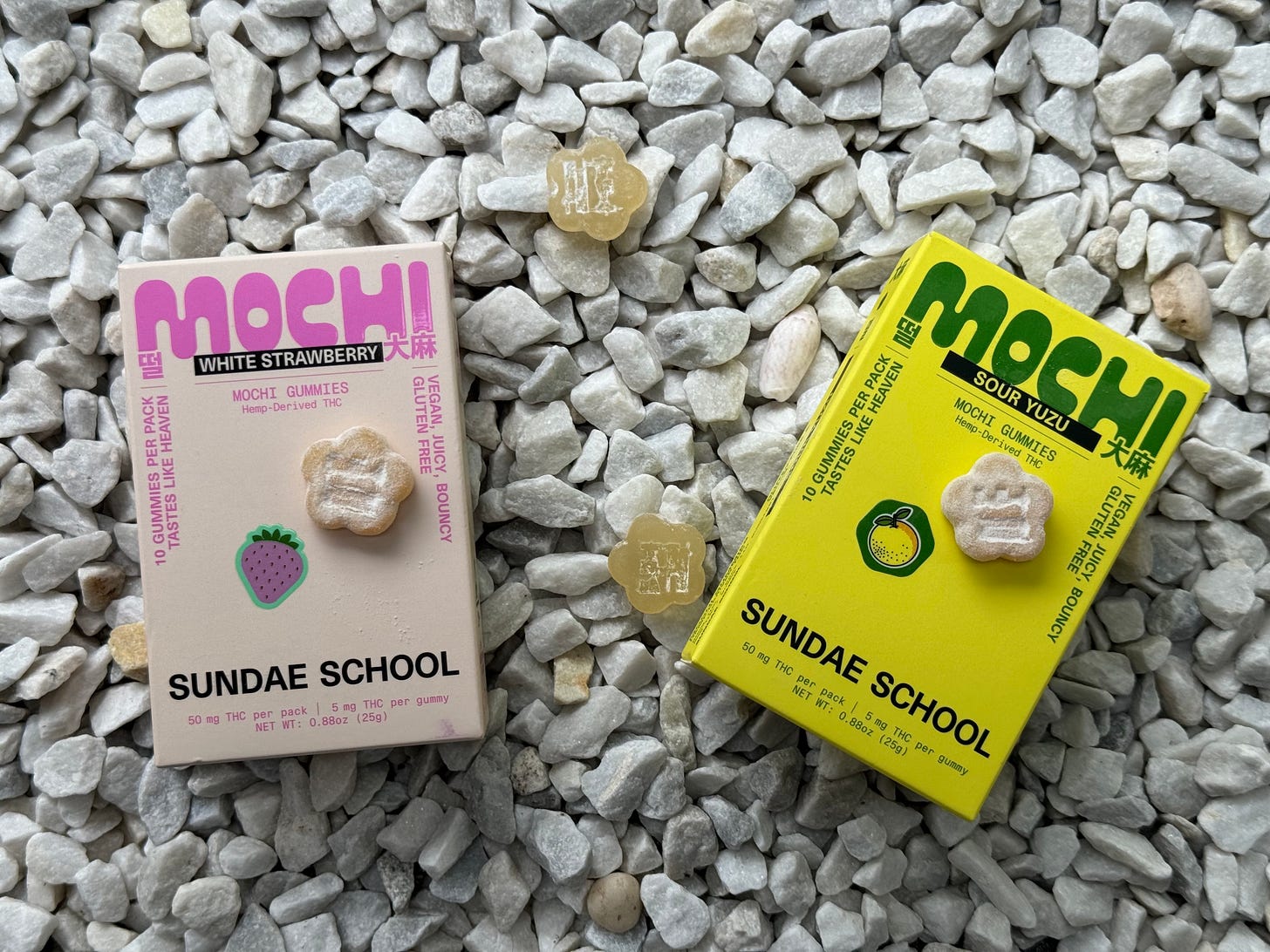My Favorite Korean American Edibles Are Finally Available Nationwide!
Sundae School goes national! Plus, what to order at Penny, a very good seafood spot by the team behind Claud
Subscribers can scroll down to access the full review of Sundae School’s new hemp gummies, along with an early take on Penny in Manhattan’s East Village
At a new seafood spot called Penny, while sitting next to a bro who dared to call lobster just “one step better than chicken” — some folks don’t really get it — I ended up eating a lot of good shellfish. As one would expect.
Mussels escabeche hummed with acidity. Charcoal squid popped with notes of smoke and chiles. And poached shrimp sported hues of red and white so vibrant I wondered whether they were auditioning to become candy canes. It all comes courtesy of ex-Momofuku chef Joshua Pinksy, who remains at the top of his game. As one would expect.
I’ll admit, however, that there was a separate pharmaceutical factor that made my meal extra delicious — a serious hit of Sundae School gummies.
The Korean American edibles let my brain zone in on all the subtle seafood flavors — and tune out the bro speak, like the other guy next to me who wasn’t sure whether he’d run a company again (“I just started a philanthropy.”).
It’s a hard knock life, right?
These gummies, to be sure, are actually mochi candies. They pack a bouncy and squishy texture — all while delivering a dreamy high. But perhaps the most fascinating thing is that Sundae School nows ships nationwide. You can even get them delivered to states like Texas, where chewing these sorts of products in a Bucc-ee’s parking lot can normally get you acquainted with the local sheriff’s department.
Rest assured, these are legal. Probably.
The Wild West era of hemp gummies
Once upon a time, if you wanted to enjoy the wonderfully potent mochi of Sundae School — a global smoke wear brand that entered the cannabis market in 2020 — you’d have to fly out to California. The chewy treats were as compelling a reason to visit Los Angeles as dinner at Kato or Pijja Palace.
The tiny gummies came in cute little tins. And they acted quickly, smoothing out the edges of a rough day in 20 minutes or so, not unlike a cold beer.
And most importantly, they tasted like something real and natural, with cool flavors like sour yuzu and boba milk tea. Co-founder Dae Lim — who was born in Seoul and raised in New York and Pennsylvania — wrote in an email to subscribers that he started the brand, in part, to “incorporate our culture” into edibles.
That’s not a minor point. The U.S. edibles market often feels like it has about as much culture as the corporate candy aisle at Duane Reade.
As good restaurants double down on personal stories and regional specialties, too many gummies can come across as oddly generic, as if they were focus grouped or created from an AI-algorithm. So there’s something nice about seeing brands like Sundae School bring a more distinct point of view to THC — especially as Modern Korean restaurants boom in New York and elsewhere.
Customers appreciate this mentality, it seems. Sundae School has sold over a million gummies from assorted dispensaries. But the margins have been thin, as Lim wrote in that same email:
Having been in California recreation market for 5 years, we have lost so much cash — not only do the dispensaries squeeze every cent for better margins & the taxes are sky high, but the dispos would also never pay on time and often DEFAULT on payment. Not to mention the slotting fees and the product trades and constant request for fleeces...”
So Sundae School took a page from the playbook of another critically acclaimed brand — Rose Los Angeles — and pivoted to national sales in April.
They did this by switching to hemp.
I’ve covered this before, so let me give you the quick version: Marijuana possession is still prohibited federally, but a provision in the 2018 farm bill has led quite a few young companies — along with Cheech and Chong — to believe they can now legally ship hemp-based edibles across state lines. The practical impact is that if you’re spending any time on Instagram, you’re probably seeing a billion wellness ads for why you should replace booze with THC and then go run a marathon while on hemp (no thank you, lol).
The crafty folks who manufacture these edibles — I always imagine it’s someone who looks like Joe Bang from “Logan Lucky” — do their best to ensure they contain about as much THC as the marijuana gummies you pick up at your fave dispensary. Specifically, these brands typically zero in on Delta-9 THC, the psychoactive chemical responsible for easing nausea, reducing anxiety, and making it feel like you’re piloting the Millenium Falcon while taking the R train to dinner at Foul Witch.
So…do Sundae School’s mail-order hemp edibles feel as strong as the stuff you used to get in California? They do not, and that’s partly due to the fact that the gummies clock in at a much lower dose. But they still work quite well. So enough with the context! Here’s everything you need to know about Sundae 2.0 gummies.
Behind the Paywall: Sundae School + Penny, Reviewed
How the Sundae School hemp gummies taste!
What type of “effects” one can expect from the mochi gummies
Analysis: Are they worth the cost?
Review: What to order at Penny in the East Village
How do they taste?
They’re delicious, and that’s why Sundae School gummies still rank as some of my favorite, even if the potency has dipped.



